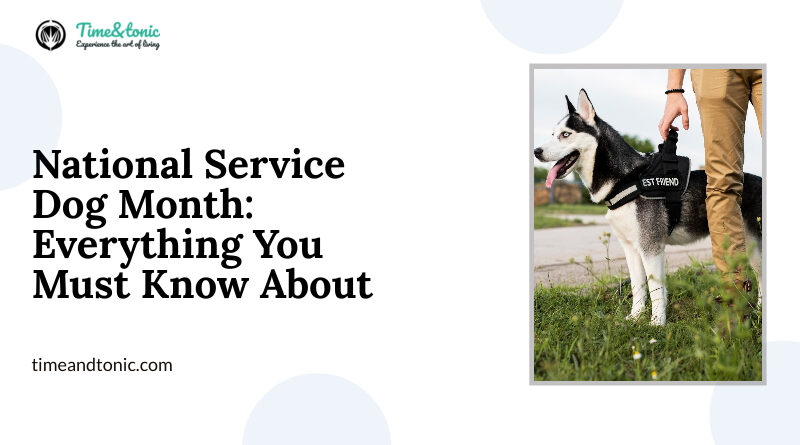National Service Dog Month: Everything You Must Know About
National Service Dog Month is a time to honor and appreciate the extraordinary contributions of service dogs to our society. These highly trained canines assist individuals with disabilities, veterans, and first responders. In this comprehensive article, we will delve into the world of service dogs, exploring their training, roles, and profound impact on the lives of those they serve. Get ready to be inspired by the heartwarming stories and essential information about National Service Dog Month.
The Significance of National Service Dog Month
National Service Dog Month, observed every September, is a month-long celebration dedicated to recognizing and appreciating the tireless work of service dogs and their trainers. It is an opportunity for the public to acknowledge these four-legged heroes and raise awareness about the vital roles they play in improving the quality of life for countless individuals.
History of National Service Dog Month
This section will explore the origins of National Service Dog Month. It’s essential to understand how this important month came to be and the milestones it has achieved since its inception.
The Role of Service Dogs
Service dogs are specially trained to assist people with disabilities in various ways. This section will delve into the diverse roles these dogs play, including:
Guide Dogs: These dogs help visually impaired individuals navigate their surroundings with confidence and independence.
Hearing Dogs: Hearing dogs assist individuals with hearing impairments by alerting them to important sounds and signals.
Mobility Assistance Dogs: People with mobility challenges rely on these dogs to perform tasks like opening doors, retrieving objects, and providing stability.
Medical Alert Dogs: These canines are trained to detect medical conditions such as seizures, diabetes, and allergies, ensuring timely assistance and safety.
Psychiatric Service Dogs: Individuals with mental health conditions benefit from the emotional support and calming presence of these dogs.
The Training Process
Behind every service dog is rigorous training conducted by dedicated professionals. In this section, we will explore the meticulous training process that equips these dogs with the skills needed to excel in their roles.
National Service Dog Month Celebrations

During National Service Dog Month, various events and activities take place across the country. This section will highlight some of the ways people celebrate and honor service dogs during this special month.
Heartwarming Stories
Prepare to be moved by real-life stories of individuals whose lives have been transformed by service dogs. These heartwarming anecdotes illustrate the incredible bond between humans and their four-legged companions.
10 Amazing Facts About Service Dogs
Highly Trained Canines:

Service dogs are more than just furry companions; they are highly trained canines dedicated to assisting individuals with disabilities. Their training involves rigorous and specialized programs aimed at honing their skills to perfection. These dogs learn to perform specific tasks that are tailored to the unique needs of their handlers. This training is not only intensive but also ongoing, ensuring that the service dogs remain reliable and proficient in their duties.
Diverse Roles:
Service dogs play a multitude of roles, each addressing specific challenges faced by their handlers. They are not a one-size-fits-all solution but rather a versatile and adaptable resource. Some of these roles include guide dogs for the visually impaired, who help their handlers navigate the world with confidence. Hearing dogs for the deaf alert their handlers to important sounds and signals, enhancing their safety. Mobility assistance dogs provide invaluable support by helping with tasks like opening doors, retrieving objects, and offering stability. Medical alert dogs are trained to detect life-threatening conditions such as seizures, diabetes fluctuations, and allergies, ensuring prompt assistance and potentially saving lives. Additionally, psychiatric service dogs offer emotional support and comfort to individuals with mental health conditions, contributing to their overall well-being.
Lifesavers:
Among the remarkable roles that service dogs play, medical alert dogs stand out as true lifesavers. These canine heroes are trained to detect subtle changes in their handler’s body chemistry, enabling them to anticipate and respond to life-threatening conditions. For instance, they can sense an impending seizure, alerting their handler or nearby caregivers. Similarly, they can detect dangerous blood sugar levels in individuals with diabetes and alert them to take necessary actions. By doing so, medical alert dogs provide timely assistance that can make a critical difference in an emergency, potentially saving lives.
Also Read:- Most Loyal Dog Breeds
Emotional Support:

Beyond their practical tasks, service dogs provide invaluable emotional support to their handlers. These loyal companions offer a source of comfort and reassurance, helping to alleviate anxiety and stress. Their calming presence can be particularly beneficial for individuals dealing with emotional or psychological challenges. Service dogs forge a deep bond with their handlers, creating a strong sense of companionship and emotional connection.
Protected by Law:
Service dogs and their handlers are often protected by laws in many countries. These laws grant service dogs the right to accompany their handlers in public places where pets may typically be restricted. This legal recognition ensures that individuals with disabilities have equal access to public spaces, including restaurants, stores, public transportation, and more. Such laws are essential to guaranteeing the independence and mobility of service dog handlers.
Not Just for Humans:
While service dogs are primarily associated with assisting humans, they can also extend their support to other species. Some service dogs are specially trained to assist veterans dealing with post-traumatic stress disorder (PTSD). These dogs can provide a sense of security and comfort to veterans, aiding in their recovery. Additionally, service dogs can work as therapy animals, providing emotional support and therapeutic benefits to children with autism and individuals in various healthcare settings.
Extensive Training:
The training process for service dogs is a labor-intensive journey that can span up to two years. During this time, they undergo intensive training sessions to master a wide range of commands and behaviors. This extensive training ensures that service dogs are reliable, well-behaved, and capable of performing their designated tasks in various situations. It’s a testament to the dedication of trainers and the incredible intelligence and adaptability of these canines.
Costly Investment:
Training a service dog is a substantial investment both in terms of time and money. The cost of training includes expenses related to professional trainers, specialized equipment, and the dog’s care. Depending on the complexity of the training and the specific tasks required, the cost can range from several thousand to tens of thousands of dollars. Despite the financial commitment, the life-changing benefits that service dogs bring to their handlers make this investment invaluable.
Changing Lives:
Service dogs have an undeniable and profound impact on the lives of their handlers. They provide much more than physical assistance; they offer a renewed sense of independence, mobility, and confidence. For individuals with disabilities or medical conditions, service dogs can be a gateway to greater autonomy and a higher quality of life. Their presence instills a sense of security and empowerment, allowing their handlers to navigate the world with newfound freedom.
National Service Dog Month:
Every September, National Service Dog Month is celebrated as a dedicated time to honor and raise awareness about the invaluable contributions of service dogs to society. During this month, people come together to acknowledge the tireless work of service dogs and their trainers. It’s a time to express gratitude and appreciation for these extraordinary canines who make a positive difference in the lives of countless individuals.
Conclusion
National Service Dog Month is a time to recognize service dogs’ remarkable contributions and celebrate their positive impact on the lives of individuals with disabilities, veterans, and first responders. Their unwavering dedication and loyalty make them true heroes. As we commemorate this special month, let us express our gratitude to these furry companions who selflessly serve as a beacon of hope and independence.
FAQ’s
National Service Dog Month was established to recognize and celebrate the invaluable contributions of service dogs. It has been observed annually in September since its inception.
You can get involved by supporting organizations that train and provide service dogs, attending local events, and spreading awareness about the significance of service dogs in our society.




